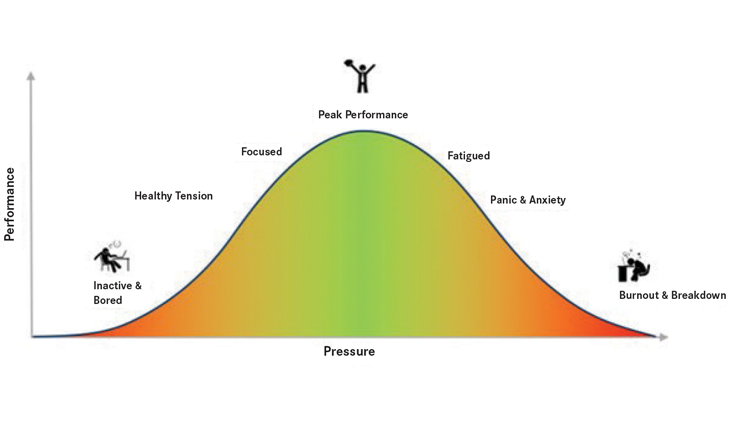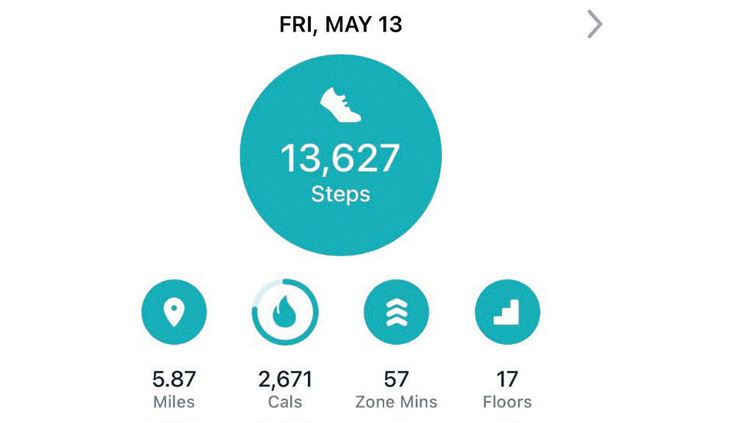Mental health issues among attorneys and legal professionals
Wellness strategies to help you deal with the stress of being a trial lawyer
Since March 2020, the only thing that has been certain is that we have been living in uncertain times. From the COVID-19 pandemic, protests, remote working, home-schooling kids to participating in Zoom court and everything in between, we have had to pivot, learn new technology, adjust to new work environments, and adapt to new ways of creating boundaries between our personal and professional lives – just to name a few of the ways we have been impacted.
Creating boundaries has been one of the biggest issues for attorneys during the pandemic and transitioning to our “new normal.” While working from home, many attorneys and legal professionals had difficulty creating boundaries and ended up working almost double the hours they normally worked because they did not need to stop work and drive home. For some, the time that you can usually destress and think about something other than work is during the commute to and from work, but that no longer existed.
We know that many attorneys were already encumbered with their caseloads, unrealistic client demands, and numerous deadlines. The pandemic made it worse. Moreover, some attorneys dealt with trying to work from home with their significant other in the next room, their kids running around the house, and pets jumping into the view of the computer camera, thus making it hard to focus and concentrate. Dealing with all of these issues led to stress, anxiety, depression, and burnout along with other mental health concerns.
Older or single attorneys
On the other end of the spectrum, some older, more seasoned attorneys, who did not have children in the home and were empty nesters, dealt with isolation and loneliness. Single attorneys who lived alone also shared the same experiences. For this group, the workplace was somewhere they could communicate and socialize with others and engage in team-building and camaraderie. However, during the pandemic, physical distancing and the stay-at-home orders intensified feelings of loneliness, leading to mental health concerns such as depression and anxiety.
Newly licensed attorneys
Another group who experienced mental health issues were the newly licensed attorneys who had to work from home, never went into the office, and had no one to train or mentor them. These new attorneys were literally learning how to practice law on their own. For many of these attorneys, this situation caused high levels of depression, stress, and anxiety.
According to the study, Stress, drink, leave: An examination of gender-specific risk factors for mental health problems and attrition among licensed attorneys, by Justin Anker and Patrick R Krill (May 12, 2021), depression, anxiety, and stress were higher in attorneys compared to the general population. Female and younger attorneys experienced worse mental health problems, and younger attorneys were two to four times more likely to report moderate to high stress. (In this study, younger attorneys are those under the age of 30.)
Working and single parents
Another segment of attorneys and legal professionals that suffered during the pandemic were working parents. In 2020 and 2021, working parents had to learn how to do their job remotely and take care of their kids while working from home. Moreover, many parents had to also home-school their children. Some working professionals also had to care for their aging parents, an additional stressor. Trying to balance all their responsibilities was overwhelming for many parents, especially those with young children. As you can imagine, dealing with these issues as a single parent was even tougher.
Working mothers
According to the U.S. Labor Department, 865,000 females (four times the number of males) dropped out of the workforce in September 2020 as families faced patchy school reopening plans. (See Work-Life Imbalance: Pandemic Disruption Places New Stressors on Women Lawyers by Cynthia L. Cooper (December 18, 2020).) The U.S. Labor Department also reported in November 2021 that the number of “quits” among all genders, dubbed the Great Resignation, rose to a record 4.5 million. As of May 3, 2022, the number of job openings was at a high of 11.5 million.
For working parents dealing with the pandemic, working remotely and merging work-life and home-life, caused stress, anxiety, and depression, which led to an increase in drinking alcohol. According to the article, Stress, drink, leave, increase in “COVID drinking” was seven times higher in female attorneys versus three times higher in male attorneys. Moreover, 24% of female attorneys versus 17% of male attorneys considered leaving the legal profession due to mental health problems, burnout, or stress. The top reason female attorneys considered leaving was due to work overcommitment.
Attorneys of color
A study on attorneys of color conducted by the American Lawyer magazine and reported in Attorneys of Color Reveal Alarmingly Higher Instances of Mental Health Struggles by Dylan Jackson (June 8, 2021), revealed that roughly 31% of Black lawyers have contemplated suicide during their career, far and above the 19% of white respondents. About 35% of Black attorneys felt anxiety based on their race, compared to 12% of Asian attorneys and 5% of Hispanic attorneys. In addition, 51% of Black attorneys and 49% of Asian and Hispanic attorneys felt their firms did not provide support for their personal well-being.
Workplace stressors for attorneys
ALM Intelligence’s 2021 Mental Health and Substance Abuse Survey, part of Law.com’s Minds Over Matters project (May 10, 2022), revealed that 72% of respondents stated the top workplace stressor was “always being on call and not being able to disconnect,” followed by 59% who cited billable hours, 57% said client demands, and 34% felt their clients “often” had unreasonable expectations.
Speaking of billable hours, an article in AboveTheLaw.com, The 2022 Am Law 100: By the Numbers (April 29, 2022), reported Goodwin Proctor was the Am Law100 firm with the lawyer with the most billable hours of 3,827 for 2021! How can that be healthy or sustainable?
According to Pandemic Anxiety Wanes, but Legal Industry Mental Health Struggles Persist by Patrick Smith (May 10, 2022), of the 3,400 law-firm respondents, 67% reported they suffered from anxiety, 35% suffered from depression, 44% suffered from isolation, and 19% contemplated suicide. Moreover, 44% felt mental health and substance use in the legal industry were at “crisis levels.” Interestingly, with respect to drug problems, only 2% admitted they had a drug problem, but 18% said they knew a colleague who did. With respect to alcohol problems, 9% admitted they had a problem, but about 44% knew of a colleague who did.
According to Combatting Stress in the Legal Profession: the ‘New Normal’ by Helen Pamely (January 5, 2022), the relationship between stress and performance can be measured on a bell curve. When stress goes beyond the peak of the bell curve, we suffer from stress-hormone overload, and performance suffers. Sustaining an overload for a long time creates imbalances in our nervous system, leaving us more vulnerable to illness. (See chart.)
Identifying triggers
It is important to discover any triggers you may have, because identifying them is an important step in being able to manage them.
Our individual needs and strengths are balanced differently. There is no ‘one size fits all.” Common indicators of stress include:
Sleep disruption – struggling to drift off, waking up throughout the night, getting fewer than seven hours of sleep.
Feeling easily irritated, moody, or short-tempered.
Having difficulty staying focused, lack of concentration, or easily distracted.
Pulling away from colleagues, friends and family, or canceling plans.
Feelings of detachment, becoming disengaged, or loss of interest.
Procrastination, missing deadlines, or conversely, feeling as though everything must be done now.
Developing unhealthy eating habits, constantly eating, mindlessly eating, or conversely, not eating, or avoiding food.
Avoiding doing things we know are good for us, such as exercise and meditation.
Increasing alcohol consumption.
Turning toward addictive relaxants.
Abusing prescription medications.
Abusing illegal drugs.
How to stay healthy and in balance
Realizing that the past three years have been extremely chaotic and we are still in uncertain times, we must remain flexible to the changes we’re dealing with each day. Getting back into a routine has been very challenging for many working professionals. Nonetheless, aim for a well-balanced lifestyle and be prepared for the uncertainties that will continue to come our way.
Wellness tools
Here are four basic tools to maintain a healthy, well-balanced, and fit lifestyle.
Sleep
We need at least seven hours of sleep each night to maintain a healthy lifestyle. One benefit of a good night’s sleep is that it improves your health by fighting off viruses and infections. Sleep deprivation can impact your body’s inflammation levels, which can increase your risk of cardiovascular disease and cancer. Sleep can help to reduce depression and anxiety. Sleep can improve your memory and learning as well as your performance and productivity. To get a good night’s sleep, stick to a schedule, optimize your bedroom environment, and have a routine to help you fall asleep, such as taking a warm bath, reading a book, or listening to soothing music.
Exercise
The Centers for Disease Control and Prevention recommends that adults ages 18-64 get at least 150 minutes a week of moderate-intensity activity, such as brisk walking, plus at least two days a week of activities that strengthen muscles, such as weightlifting, that work all major muscle groups. For adults 65 and older, the recommendations are the same but include activities to improve balance. Tai Chi, which is a slow-movement meditation activity, can help with improving balance. The bottom line is that any activity, even 10 minutes a day, is better than no activity at all.
As working professionals who sit at a desk most of the day, we all need to stretch at least every 30 minutes and get up and move about every hour to avoid pain to the neck, back, shoulders, hands, and wrists. A standing desk can help you alleviate some of the pain you may get from sitting, by changing to different positions throughout your workday.
Schedule exercise into your daily activities. Thirty minutes a day, five days a week, will meet the minimum requirements. With the hectic schedule you may already have, it can be challenging to add more to your plate, but the benefits of exercise outweigh the burdens. Some suggestions may be to get up one hour earlier so that you have some time to yourself to mentally plan your day, incorporate your daily exercise routine, and practice meditation and mindfulness (which will be discussed later).
Talk to your medical provider about any recent health issues or injuries before starting any exercise routine. If you are a beginner, start slowly and gradually work your way up to 150 minutes a week. By integrating exercise into your morning routine, you will feel more energized and ready for the challenges of the day, rather than worrying about how to squeeze it into your busy schedule later in the day or giving yourself an excuse not to do it!
Diet
There are so many different diets and recommendations that it is difficult to figure out which is the right one for you. The only way to know is to conduct your own research based on your individual body type, your health, the medications you take, the amount of daily exercise you get, your age, and other factors. No matter what type of diet is right for you, make sure that you’re eating the recommended daily amounts of fruits, vegetables, grains, protein, and dairy products and keep hydrated with water throughout the day. If you suffer from food allergies or have health issues, such as diabetes, you have to be even more mindful of your nutrition. Consider seeking professional advice on healthy eating from a nutritionist.
Meditation and mindfulness
Just like nutrition, another tool for your wellness toolkit is meditation and mindfulness. While there are numerous articles and references that describe these two as separate disciplines, for this article, I will use meditation and mindfulness interchangeably to keep it basic.
Attorneys and legal professionals are often Type A workaholics who love challenges, are always busy, and are in a high-stress profession. Being constantly on the go, on edge, or in a high state of alertness can be detrimental if you never take a break to renew, refresh, and rejuvenate. This is where meditation and mindfulness can help. It is not focusing on the past or future, but instead, putting yourself in a present state of mind and focused attention through breathing techniques.
If you have never practiced meditation or mindfulness, you can download apps on your smart phone that will guide you. Some apps are Headspace, Calm, Insight Timer, Unplug, and many others. You can start with just a couple of minutes and work your way up to 20, 30, or even 60 minutes a day – whatever you can fit into your schedule. Meditation can bring you a sense of calm, balance, and peace that can benefit your emotional well-being and overall health.
Fitness trackers
To help keep track of all the tools in your wellness toolkit, there are fitness trackers such as Fitbit, Apple watch, Garmin, and many others. My Fitbit helps me track my daily exercise, food, water intake, weight, sleep, heart rate, oxygen saturation, and other functions that can help manage stress. It reminds me every hour to get up and move about. I also enter in weekly competitions with my Fitbit friends to see who has the most steps, which is another motivating factor for me to exercise. Most fitness trackers have similar features.
The Fitbit tracker showing the number of steps, miles, calories burned, zone minutes (fat-burning heart rate zone), and floors climbed throughout the day. (See graphic.)
Defining lawyer well-being
According to The Path to Lawyer Well-Being: Practical Recommendations for Positive Change (The Report of the National Task Force of Lawyer Well-Being, August 14, 2017), well-being is part of a lawyer’s ethical duty of competence. It includes a lawyer’s ability to make healthy positive work-life choices. To provide a quality of life for a lawyer’s family, friends, and clients, a lawyer must maintain a healthy, well-balanced lifestyle. (See graphic, at left.)
Resources for attorneys and legal professionals
Lawyer Assistance Program
The Lawyer Assistance Program (LAP) is an excellent but underused resource that is open to California attorneys (active, inactive, and disbarred) as well as law students and bar applicants. The program provides short-term career counseling for participants who have difficulty finding meaningful work, are unsatisfied with their current employment, or who want to better utilize their law degree. The program also provides short-term counseling sessions with a therapist who specializes in stress, relationship challenges, burnout, or grief. Due to the pandemic, all sessions are conducted virtually.
Participants who need longer-term support can access through the LAP a free orientation and assessment by one of the LAP’s clinical rehabilitation coordinators (CRCs), who will conduct a virtual intake and provide a treatment and recovery plan. The CRC will help the participant find a therapist who specializes in their specific issues and weekly group support sessions that the participant can attend virtually. The LAP has financial assistance for those who qualify.
The LAP is confidential as mandated by California Business and Professions Code section 6234 unless waived by the participant or a mandated reporting by a healthcare professional.
The LAP provides free one-hour MCLE presentations on competency to law firms, bar associations, government agencies, organizations, etc. The LAP also provides free presentations to law students, bar applicants, law schools, and law student organizations on substance use and mental health issues as well as wellness strategies for legal professionals.
For more information on the LAP, you can email, call 877- LAP-4-HELP (877-527-4357), or visit the website.
Other resources
The ABA Commission on Lawyer Assistance Programs (CoLAP) has articles, podcasts, and other valuable resources on substance use and mental health issues.
The Other Bar is a substance-use recovery program open to California attorneys, judges, law students, and bar applicants.
The Lawyers Depression Project is a peer support group that provides free resources to attorneys, law students, paralegals, and administrative professionals.
The Prevalence of Substance Use and Other Mental Health Concerns Among American Attorneys by Patrick R. Krill, JD, LLM, Ryan Johnson, MA, and Linda Albert, MSSW (February 1, 2016), is the most recent nationwide study on substance use and mental health issues among attorneys and judges.
A Wellness Guide for Senior Lawyers, Their Families, Friends, and Colleagues provides information on health problems that come with age, such as dementia and Alzheimer’s Disease. It also provides information for attorneys who are closing or selling a law practice.
National Suicide Prevention Lifeline, national, toll-free, and available 24/7, 800-273-TALK (800-273-8255).
Crisis Text Line Need help? Text START to 741-741.
Conclusion
We have discussed some of the mental health problems that attorneys and legal professionals have had to deal with during these challenging times. We have identified some of the triggers that can impact legal professionals and the wellness strategies and resources to combat them. It takes a strong person to admit they need help and an even stronger person to ask for help.
Lita Abella

Lita Abella is a native of Southern California, born and raised in Hollywood. Lita earned a Juris Doctor from Western State University College of Law in Fullerton. Lita is a Senior Program Analyst at the State Bar of California, where she conducts outreach and is an MCLE presenter for the Lawyer Assistance Program (LAP). LAP assists law students, bar exam applicants, and attorneys with substance use and mental health issues. Prior to that, Lita worked as an investigator in the Office of Chief Trial Counsel where she investigated and assisted in the prosecution of attorneys for misconduct. She has been with the State Bar for over nine years.
Copyright ©
2025
by the author.
For reprint permission, contact the publisher: Advocate Magazine


